Related Research Articles

Justus von Dohnányi is a German actor, best known for portraying Wilhelm Burgdorf in 2004 film Downfall.

Street Acquaintances is a 1948 German drama film directed by Peter Pewas and starring Gisela Trowe, Alice Treff and Ursula Voß. It was made by the Communist-controlled DEFA studios in the Soviet Zone of Germany Released in both the future West and East Germany it was a popular hit and sold 6,469,626 tickets. While it can be regarded as using a style that resembled the Italian neorealist films of the era, it has also been suggested that it returns to the more traditional style of the Weimar era. It portrays the dangers of spreading venereal disease.

Sonja Sutter was a German film actress. She was one of the few actors that was allowed to appear in productions in both East and West Germany. She is remembered for her role as Fraulein Rottenmeier in the German TV series Heidi from 1978. This series aired in many countries in Europe during the 1980s and 1990s, and was dubbed into several languages. She is also remembered for having had several roles in the TV series Derrick from 1983 to 1998.
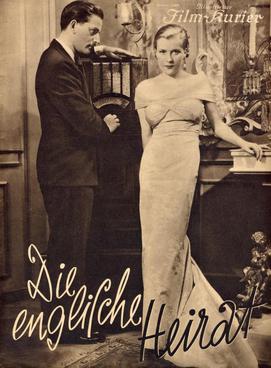
The English Marriage is a 1934 German comedy film directed by Reinhold Schünzel and starring Renate Müller, Anton Walbrook and Adele Sandrock. It was based on a novel of the same title by Ludwig von Wohl who also wrote the screenplay. The film's sets were designed by the art director Otto Hunte. Location shooting took place at Berlin's Tempelhof Airport and on Heligoland. It was made by Cine-Allianz and a number of those involved including its director, producers, screenwriter and star Anton Walbrook soon after left Nazi Germany due to their Jewish backgrounds.
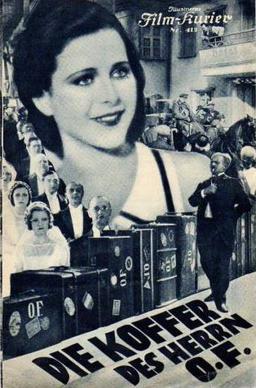
The Trunks of Mr. O.F. is a 1931 German comedy film directed by Alexis Granowsky and starring Alfred Abel, Peter Lorre, and Harald Paulsen. Produced by Tobis Film, it was made at the Johannisthal Studios in Berlin with sets designed by the art director Erich Czerwonski. The film was shot between 15 September and 17 October 1931 and premiered in Berlin's Mozartsaal on 2 December 1931. The film was then heavily cut down to a shorter running time, and re-released under the alternative title Building and Marrying. It received its Viennese premiere on 4 June 1932.

We Make Music is a 1942 German musical comedy film directed by Helmut Käutner, starring Ilse Werner, Viktor de Kowa and Edith Oß. It was shot at the Tempelhof Studios in Berlin. The film's sets were designed by the art directors Max Mellin and Gerhard Ladner.
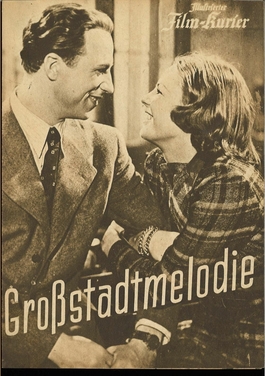
Melody of a Great City is a 1943 musical drama film directed by Wolfgang Liebeneiner and starring Hilde Krahl, Werner Hinz and Karl John. A young woman moves to Berlin to work as a press photographer.

Nights on the Road is a 1952 West German crime drama film directed by Rudolf Jugert and starring Hans Albers, Hildegard Knef, Marius Goring and Lucie Mannheim. It was produced by the veteran Erich Pommer who had returned to Germany after years of exile. It is one of the more prominent German film noirs. It was acclaimed by German critics on its release and was awarded a prize at the Berlin Film Festival. It was shot at the Bavaria Studios in Munich and on location in Frankfurt and various autobahns. The film's sets were designed by Rudolf Pfenninger and Ludwig Reiber. The production budget was around 900,000 deutschmarks.

Hurrah! I'm a Father or Hurrah! I'm a Papa is a 1939 German comedy film directed by Kurt Hoffmann and starring Heinz Rühmann, Albert Florath, and Carola Höhn.

The Little Escapade is a 1931 German comedy film directed by Reinhold Schünzel and starring Renate Müller, Hermann Thimig and Hans Brausewetter. It was shot at the Babelsberg Studios in Berlin and premiered at the city's Gloria-Palast. The film's sets were designed by the art directors Robert Herlth, Walter Röhrig and Werner Schlichting. A separate French-language version was also made.
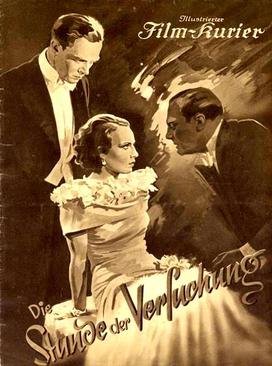
The Hour of Temptation is a 1936 German mystery film directed by Paul Wegener and starring Gustav Fröhlich, Lída Baarová and Harald Paulsen.

The Country Schoolmaster is a 1954 West German drama film directed by Hans Deppe and starring Barbara Rütting, Claus Holm and Herbert Hübner. It is a remake of the 1933 film of the same title. It is sometimes known by the alternative title Eternal Love.

Girls to Marry is a 1932 German romantic comedy film directed by Wilhelm Thiele and starring Renate Müller, Hermann Thimig and Wolf Albach-Retty. It was shot at the Babelsberg Studios in Berlin. The film's sets were designed by the art director Hans Jacoby. It was remade the same year in Britain as Marry Me, also directed by Wilhelm Thiele, with Müller starring again.

Tell the Truth is a 1946 German comedy film directed by Helmut Weiss and starring Gustav Fröhlich, Mady Rahl, and Ingeborg von Kusserow. The film had a troubled production, and was originally filming in the final days of the Nazi era with Heinz Rühmann and his wife Hertha Feiler in the lead roles. Production was halted when Soviet forces took control of the Tempelhof Studios during the Battle of Berlin. The film was then remade in the British sector of Berlin with different leads but using substantial amounts of footage already shot during the previous production.

Painted Youth is a 1929 German silent drama film directed by Carl Boese and starring Toni van Eyck, Wolfgang Zilzer, and Olga Limburg. It was shot at the National Studios in Berlin. The film's sets were designed by Karl Machus.
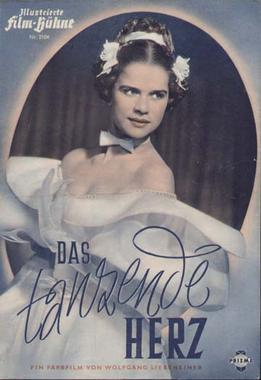
The Dancing Heart is a 1953 West German historical musical comedy film directed by Wolfgang Liebeneiner and starring Gertrud Kückelmann, Gunnar Möller, and Wilfried Seyferth. It was made at the Tempelhof Studios in Berlin. The film was shot using Agfacolor. The film's sets were designed by the art directors Emil Hasler and Walter Kutz.

Liselotte of the Palatinate is a 1966 West German historical comedy film directed by Kurt Hoffmann and starring Heidelinde Weis, Harald Leipnitz and Karin Hübner. It portrays the marriage of the German princess Liselotte of the Palatinate to Philippe I, Duc d'Orléans the brother of Louis XIV and her adventures at the French court.

How Shall I Tell My Husband? is a 1932 German comedy film directed by Reinhold Schünzel and starring Renate Müller, Georg Alexander, and Ida Wüst. It was shot at the Babelsberg and Tempelhof Studios in Berlin. The film's sets were designed by the art director Werner Schlichting. Location filming took place at Heringsdorf on the Baltic Sea. It premiered at the Gloria-Palast in Berlin.
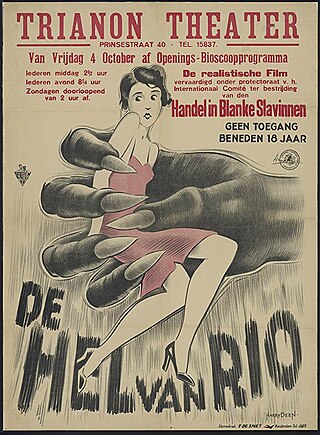
The Bordello in Rio or The Women's House of Rio is a 1927 silent drama film directed by Hans Steinhoff and starring Vivian Gibson, Albert Steinrück and Hans Stüwe. It was based on a novel by Norbert Jacques which was remade twice as Blondes for Export (1950) and Final Destination: Red Lantern (1960). In the United States, the film was re-edited by Bud Pollard and released as Girls for Sale.

Operation Sleeping Bag is a 1955 West German comedy war film directed by Arthur Maria Rabenalt and starring Eva Ingeborg Scholz, Paul Klinger and Karlheinz Böhm.